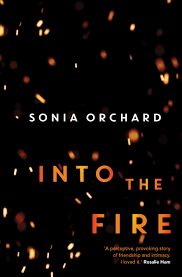Into the Fire (Affirm Press 2019) by author Sonia Orchard is an engaging and thought-provoking exploration of friendship, motherhood, ambition, jealousy, gender equality issues, mental health and the choices we make along life’s path.
In a fluid back and forth narrative, Orchard builds the lives of the main characters Alice, Lara and Crow, by introducing their idealistic younger selves, full of dreams and idealism and activism, and depicting their maturation into adulthood, where pragmatism and the needs of others tend to come before selfishness; where the reality of our lives is sometimes very far from the idea of what our younger selves imagined, or the illusion of what we see as the truth. This is a close and tender examination of relationships – between women, between friends, between lovers, between parents and their children – that raises existential and ideological questions about our true identity, our true fears and our true desires.
Set a year after her best friend Alice died in a tragic housefire, the book is narrated by Lara who is still reeling from the loss. She knows Alice was unhappy and cannot shake the feeling that it may have been her – Lara – who is somehow responsible for what happened. As she spends the weekend visiting Alice’s widower, Crow, and their children, Lara tries to capture the threads of the recent and distant past in an attempt to understand the intense relationship between her and Alice and Crow, and why the situation got so out of control.
A meditation on love, loss, control, power, guilt, shame and betrayal, Into the Fire is a literary tale of insightful prose and perceptive character assessments, but it also contains a mystery at its heart; a mystery concerning the fire. Like fragile and ephemeral pieces of floating ash, the truth of what happened that night is all around Lara yet impossible for her to grasp.
This book opens up the lids of many boxes that people – especially women – tend to keep tightly closed: our secret thoughts, our hidden shames and desires and jealousies, the way we submerge the space between what we think and how we believe we are supposed to act. In addressing the timeless issues of the responsibilities of parenting and the pull of family, with the more recent conflicts of judgement around women’s lifestyle choices, and the struggle for women to ‘have it all’ or to concede defeat in one or more areas of their lives, Orchard is fearless in asking the difficult questions that many of us have formed in our minds but are too afraid to ask or answer, and certainly too afraid to dissect with any level of vigour. We recognise these characters, and parts of many of them may well be the parts of us that we are tempted to ignore or are ashamed to confront. And as this slow-burning book reaches its shocking conclusion, we are forced to reconsider not only the characters in this story, and their role in the events that occurred, but also our own culpability and the choices we would make if faced with the same circumstances.

